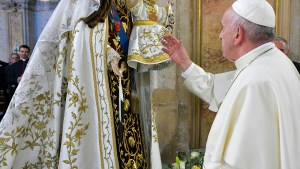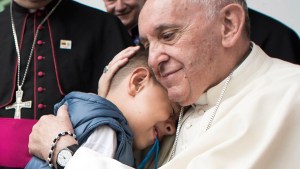Pope Francis on Wednesday continued with his teaching on prayer, inviting us “to learn to pray increasingly well, as Jesus taught us. We must pray like He taught us.”
[Jesus] said: when you pray, enter into the silence of your room, withdraw from the world, and address God, calling Him “Father”! … True prayer is that which is carried out in the secrecy of the conscience, of the heart: inscrutable, visible only to God. God and I.
The pope said that we must be exceedingly honest in prayer, because anyway, with God “it is impossible to pretend.”
God knows us in this way, naked in the conscience, and we cannot pretend. At the root of dialogue with God there is a silent dialogue, like the exchange of glances between two people who love each other: man and God exchange glances, and this is prayer. Looking at God and letting oneself be looked at by God: this is prayer. “But, Father, I do not say any words…”. Look at God and let yourself be looked at by Him: this is a prayer, a beautiful prayer.

Read more:
Let God and Mary look at you and gaze upon you, says Francis
But prayer, while being “entirely confidential,” is never exclusive. Though we go into the secret of our rooms, we don’t leave the world outside. One who prays “brings into his heart people, situations, problems, many things.”
The Holy Father led the crowd in noting that the word “I” is never present in the Lord’s Prayer.
Jesus teaches us to pray with the word “you” on our lips, first and foremost, because Christian prayer is dialogue: “hallowed be your name,” “your Kingdom come, your will be done.” Not my name, my kingdom, my will. I no, it doesn’t go. And then it passes to “we.” All the second part of the Lord’s Prayer is in the first person plural: “give us this day our daily bread,” forgive us our trespasses,” “lead us not into temptation,” “deliver us from evil.” Even man’s most elementary requests – such as having food to dispel hunger – are all in the plural. In Christian prayer, no one asks for bread for himself: give me my daily bread, no, give us, we implore for all, for all the poor of the world. We must not forget this, the word “I” is missing. One prays with “you” and with “we.” It is a good teaching of Christ’s, do not forget.
The pope says there is “no space for individualism in dialogue with God.”
There is no ostentation of one’s own problems as if we were the only ones to suffer in the world. There is no prayer raised to God that is not the prayer of a community of brothers and sisters, the we: we are in a community, we are brothers and sisters, we are a people who prays, “we.”
Pope Francis recalled an experience when a prison chaplain asked him: “Tell me, Father, what is the opposite of ‘I’?“
Naively I answered, “you.”“This is the beginning of war. The word that is the opposite of ‘I’ is ‘we’, where there is peace, all together.”
The pope remarked that it was “a good teaching that I received from that priest.”
In prayer, a Christian bears all the difficulties of the people who live next to him: when evening falls, he tells God of the sufferings he has encountered in that day; he places before Him many faces, friends, and also the hostile … If one does not realize that there are so many people around him that are suffering, if he does not pity the tears of the poor, if he is addicted to everything, then it means that his heart … how is it? Is it wilted? No, worse: it is made of stone. In this case it is good to beg the Lord to touch us with His Spirit and to soften our heart: “Touch my heart, O Lord.” This is a beautiful prayer: “Lord, soften my heart, so that I can understand and take up all the problems, all the pains of others.” Christ did not pass unharmed by the miseries of the world: whenever He perceived a loneliness, a pain of the body or the spirit, He felt a strong sense of compassion, like a mother’s womb. This “feeling compassion” – let us not forget this very Christian word: feeling compassion – is one of the key verbs of the Gospel: it is what drives the good Samaritan to approach the wounded man on the roadside, unlike others who have a hardened heart. We can ask ourselves: when I pray, do I open myself up to the cry of so many people, near and far? Or do I think of prayer as a form of anaesthesia, so as to be calmer? … If that’s the case … certainly, mine would no longer be a Christian prayer. Because that “we,” that Jesus taught us, prevents me from being in peace by myself, and it makes me feel responsible for my brothers and sisters. There are men who apparently do not seek God, but Jesus makes us pray for them too, because God seeks these people most of all. Jesus did not come for the healthy, but for the sick, for the sinners (cf. Lk 5. 31) – that is, for everyone, because he who believes he is healthy, in reality is not. If we work for justice, let us not feel we are better than others: the Father makes His sun shine over the good and the evil (cf. Mt 5: 45). The Father loves all! Let us learn from God Who is always good with everyone, unlike we who manage to be good only with some, with those we like. Brothers and sisters, saints and sinners, we are all beloved brothers of the same Father. And, in the eventide of our life, we will be judged on love, on how we have loved. Not a love that is merely sentimental, but also compassionate and concrete, following the Gospel rule – do not forget it! – “Whatever you did for one of the least of these brothers and sisters of mine, you did for me” (Mt 25: 40). Thus says the Lord.

Read more:
The word Abba is like a recording of Jesus’ voice, says pope
